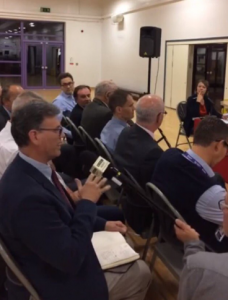The big debate – grammar schools
This week I was invited to be an audience member for a BBC Radio Kent debate on grammar schools.
I was invited to be an audience member for a BBC Radio Kent debate on grammar schools.
They had a very diverse panel, from a headteacher of an Academy vehemently opposed to grammar schools to journalist and author Peter Hitchens, a passionate advocate for the return of grammar schools.
You can view the debate here: https://www.facebook.com/BBCRadioKentOfficial/videos/1215854821806048/
The night proved to be a very interesting insight into the differing views of the government’s recent announcement to end the ban on the opening of new grammar schools.
When I was given the opportunity to speak, it was to raise the area I care most passionately about – raising standards at primary school level.
If children are finding grammar school entry tests difficult, and require tuition to pass them, it is because the primary curriculum is not demanding enough.
When you think about it, the 11+ test consists mainly of English and maths, and children are still struggling to grasp the basics in these subject areas.
Though it is an improvement on its predecessor, the new maths curriculum still leaves children without many of the basic skills that the 11+ exam test requires. As an advisor on the new curriculum during its formation, I raised this point at the time and protested that it still falls far short of the demands made on children in the Singapore Curriculum. This unfortunately fell on deaf ears.
The foundation of what is taught today in Singapore finds its root in Britain’s association with Singapore in the last century. Today, the more progressive approaches to learning installed in the British curriculum are proving to be disastrous.
It is important for any country to nurture its most academically talented children, whatever their social background. This is a national choice and not just a personal choice issue.
For the good of everybody and our economy, we need to be able to compete in a global environment. This means we cannot afford to disadvantage poorer children and ignore the talent that is there.
The issue of grammar schools not helping the poorest children is an accusation that has often be levelled by those not in favour of a system based on academic selection. However, this only occurs because there are not enough grammar schools and they are not in the right areas. We should be building grammar schools in areas of social deprivation to ensure that we are able to nurture the talents of academically gifted children that live there. At the moment many are being left behind by a comprehensive system that has effectively resulted in the quality of school a child can go to being predetermined by the area in which their parents can afford to live.
The issue of pressure on children constantly came up during the debate. However, as Peter Hitchens said – and I backed him on this – you cannot achieve anything without pressure.
Most primary schools in Britain set very little homework, whereas the private prep school system does, and this is one reason why the children at those schools are further ahead of their state school counterparts.
The constant complaint that there are too many tests/assessments is something I find baffling. Teachers test children all the time in the classroom by asking them questions, conducting little tests, setting work and marking it. There is nothing wrong with testing – it is a vital part of teaching.
The fact that we have national tests is also necessary. We have to know if what we are teaching is being understood. Pressure is necessary to achieve change – this is true of athletes and it is true academically – the brain will not develop unless we challenge and stimulate it to take on information.
If we are to allow more grammar schools to open, I would urge the government to be more fluid on points of entry to the grammar system.
I would suggest that children could be tested at ages 11, 14 and 16 so there is no blanket test that strictly determines a child’s future. As well as providing academically gifted children with opportunities to maximise their talents, we must also ensure that those who wish to pursue a more technical/vocational orientated education are catered for too.
We need to have different pathways for different children so that each child receives the right and appropriate kind of education to fulfil their potential.